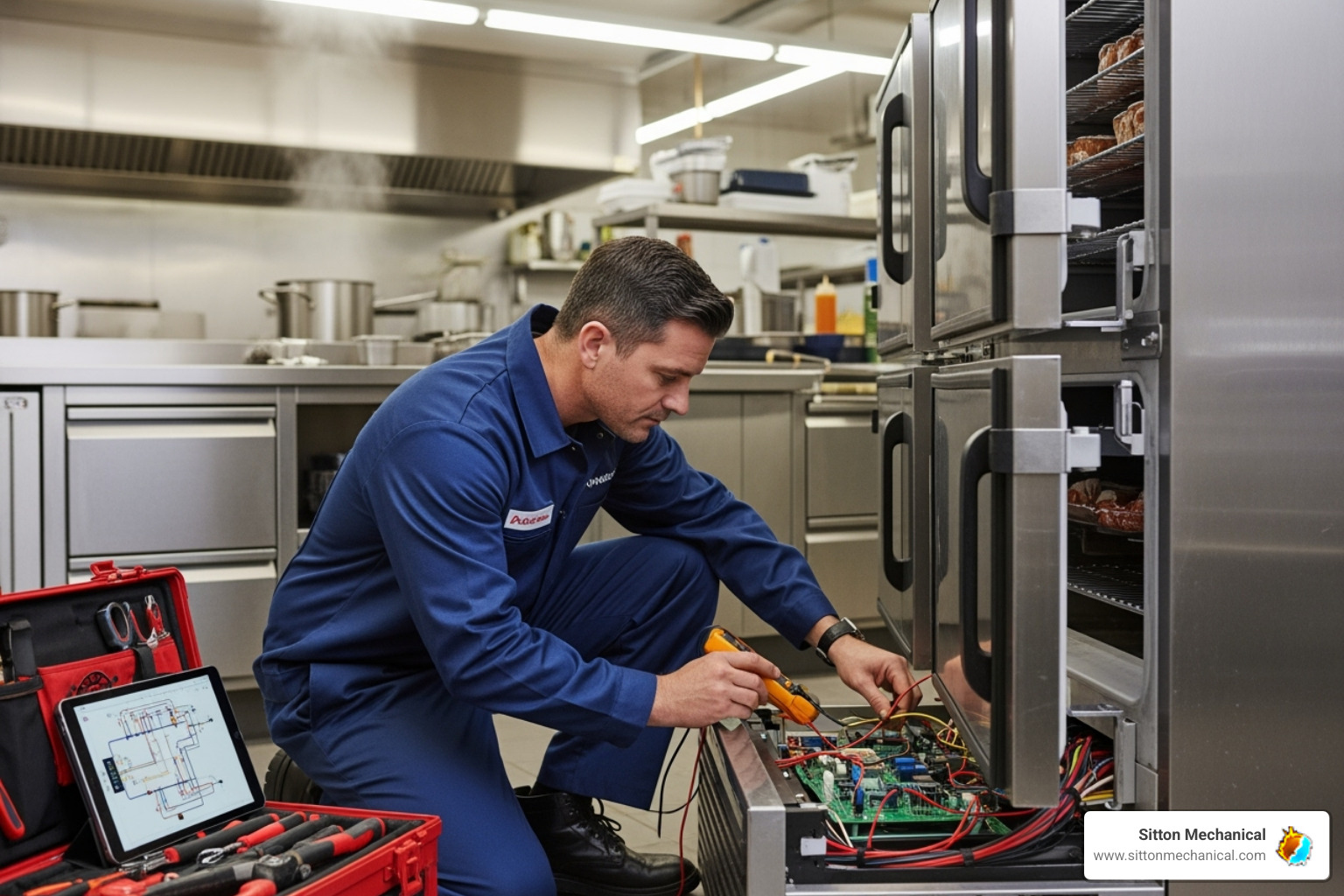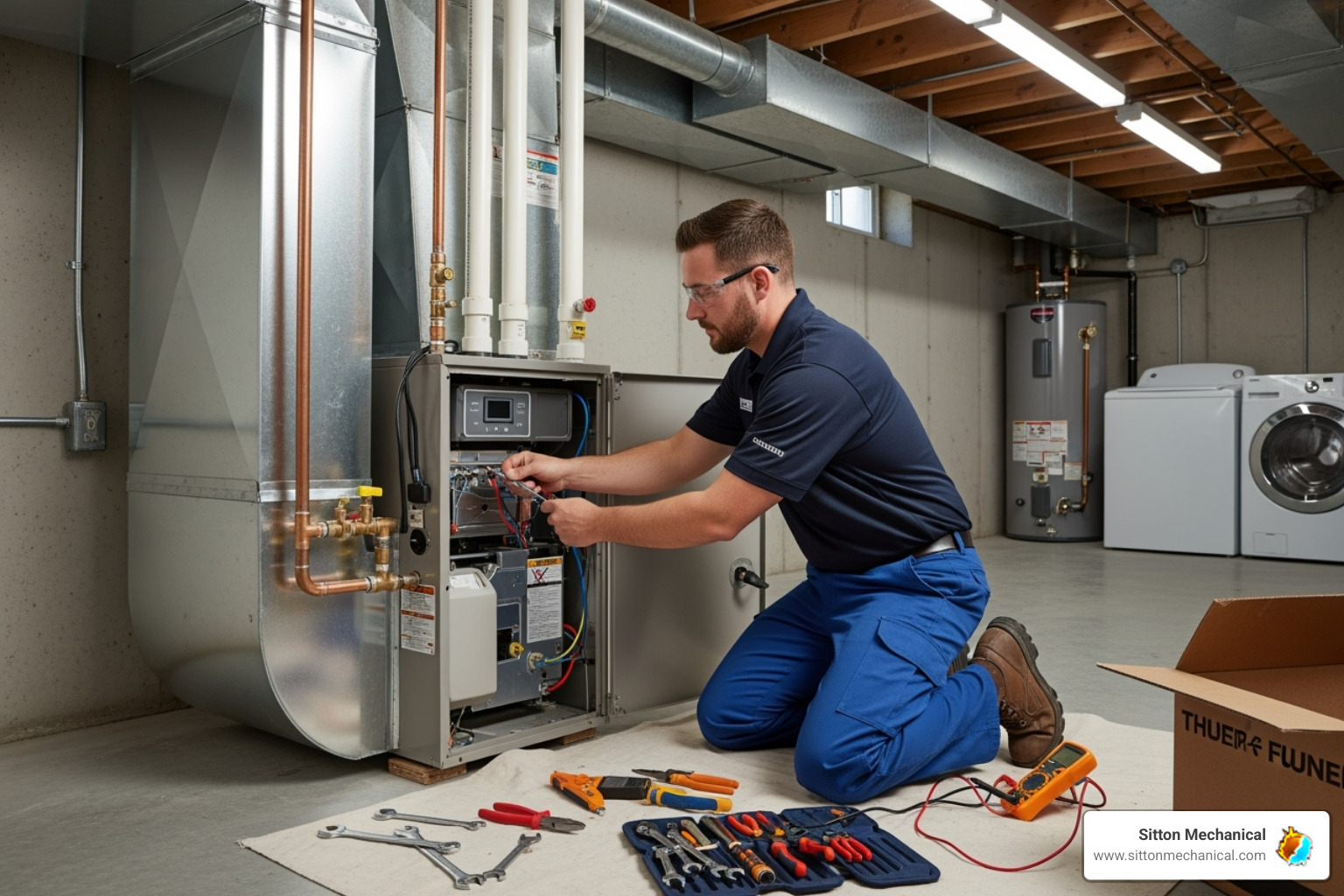Noticing water around your air conditioning unit during the middle of summer can be a frustrating surprise for any homeowner in Stillwater. A leak from your AC system may seem small at first, but it can cause more than just a wet floor. Left unchecked, it can lead to damage in the walls, ceilings, and even your foundation. Damp areas also create an environment where mold and mildew can thrive, which can lead to even bigger concerns down the road.
AC water leaks usually start quietly, but they tend to escalate quickly if ignored. You might spot some water collecting near the base of the indoor unit or notice a musty smell in the air. Even these smaller signs should not be brushed off. Addressing them early protects your home and ensures your system continues to perform when temperatures in Stillwater hit their peak.
Understanding AC Water Leaks
An AC system removes heat and humidity from the air inside your home. That moisture has to go somewhere, and it is normally collected in a drip pan and drained outside through a condensate line. When any part of this process breaks down, water can end up leaking inside instead.
Here are a few common reasons why this can happen:
1. Clogged Condensate Drain Line
As your AC runs, it creates condensation that flows through a small drain. Over time, dirt, algae, and debris can build up and clog that line. Once this happens, water starts backing up and potentially spilling into your home rather than draining out properly.
2. Damaged or Rusted Drain Pan
Older systems or those that have not been maintained routinely may have cracks or rust in the drain pan. A damaged pan means water has nowhere to go and will leak directly onto the floor or nearby surfaces.
3. Frozen Evaporator Coils
When the evaporator coil freezes, it eventually melts and can produce excess water that floods the system. Low refrigerant, poor airflow, or dirty air filters can lead to frozen coils, which then cause leaking as they thaw.
4. Loose or Uninsulated Drain Lines
Improper installation or wear can lead to slip-ups in drain line insulation or fittings. This can cause condensation to form along the outside of the line or lead to leaks at connection points.
5. Refrigerant Problems
Low refrigerant levels drop the pressure in the system, which can cause coils to freeze. When they finally defrost, you are left with water spilling over into the surrounding area.
Each of these problems can come from a different part of the AC system, but they all result in the same issue: unwanted water inside your Stillwater home. Whenever you see moisture where it does not belong, it is important to act quickly before the problem grows.
Immediate Steps To Take When You Notice a Leak
Seeing water around your indoor AC unit during the summer is not something you should ignore. Before jumping to conclusions, there are a few steps you can take to stop the damage from getting worse and protect your home.
Here is what you can do right away:
- Turn Off the AC Unit
Switch the system off at the thermostat and also consider shutting off power at the breaker. This stops the system from producing any more condensation and helps prevent electrical issues if water is spreading.
- Clean Up Standing Water
Wipe up visible water to prevent it from soaking into flooring, walls, or personal belongings. Quickly removing the water stops additional damage and reduces the chance of mold development.
- Inspect for Obvious Clogs
If you have access to the drain line, check to see if there is visible buildup or blockage. While you may not be able to do a deep cleaning yourself, seeing where the problem might be can help our technicians solve it faster.
- Check the Air Filter
A dirty air filter restricts airflow and increases the chance of frozen coils, which will later lead to leaks when they thaw. If the filter looks dark or clogged, it needs to be replaced.
- Notice Any Unusual Sounds or Smells
Gurgling, dripping, or musty odors can give a clue to the root cause. Mentioning these observations can help narrow it down when you schedule repair service.
Some homeowners in Stillwater have caught leaks early and avoided serious damage just by acting quickly. In one case, a homeowner saw only a few drops under the unit but chose to turn off the system and check the air filter. That small choice prevented serious damage to their wood flooring. Fast action with the right support leads to better outcomes.
Common Solutions to Fix AC Water Leaks
Once those first steps are taken, fixing the cause of the leak is the next priority. Problems often come down to clogged pipes, worn-out parts, or issues with how everything is set up.
Here are common solutions our technicians use:
- Clear the Condensate Drain Line
When the drain is blocked, water backs up. Our professionals use tools like a wet/dry vacuum or pressurized cleaning methods to remove buildup and restore clear drainage.
- Repair or Replace the Condensate Pan
If the pan is cracked or rusted, it will need to be sealed or replaced. When repair is not possible, our technicians install a new pan so water flows into it properly.
- Adjust the Slope of the Drain Line
The drain line needs a downward angle to let water flow out. If it shifts or is not installed correctly, our professionals adjust or support it to avoid future issues.
- Replace Faulty Condensate Pumps
Some systems need a pump to push water out. If the pump fails, nothing moves. We check the pump and replace it if needed to keep the system draining as expected.
- Check Refrigerant Levels and Coils
If leaks are caused by freezing and thawing coils, our technicians inspect refrigerant levels and recharge the system if needed. We also check coil condition and airflow.
Just clearing a clog may help today, but it is not a permanent fix if coils are freezing or parts are worn out. Our technicians look at the system as a whole so the leak does not come back next week.
Preventative Measures to Avoid Future Leaks
Once your AC system is no longer leaking, regular care helps stop it from happening again. Cooling systems in Stillwater work hard during the summer, so it is smart to check a few small things often.
Here are some ways to avoid leaks down the line:
- Change Air Filters Regularly
A dirty filter blocks airflow and causes extra strain. It can also lead to frozen coils. Replace the filter every 1 to 3 months, depending on use and your home’s conditions.
- Clear the Area Around the Unit
Debris, insulation, boxes, or clutter around the unit can cause problems. Keep the area clean so the system has space to work and vent properly.
- Schedule Regular Inspections
Let our technicians inspect your AC system once or twice a year. These visits help catch small issues early before they become full leaks or damage your walls and floors.
- Watch for Moisture or Musty Smells
A musty odor or small puddle that appears suddenly could be the first sign of trouble. Even if cooling seems fine, take note of these early warnings.
- Drain Line Treatments
During maintenance visits, our professionals can use treatments that help prevent algae buildup inside the line. Keeping it clean helps water exit normally.
AC issues usually do not show up in a major way out of nowhere. They build slowly—from a missed inspection, a skipped filter change, or a clog that was almost cleared. Regular routines and quick action go a long way.
Keeping Your Stillwater Home Dry and Comfortable
Air conditioners help your house stay cool, but they also manage indoor moisture. When things are running right, this works perfectly. But when leaks happen, moisture inside your home can create damage, discomfort, and more stress than expected.
Having clear steps to take and knowing warning signs can make a big difference. Catching problems early before moisture spreads helps your home stay safe and keep repair costs low. With steady upkeep and professional support, you can count on your system to run strong through every Stillwater summer day. Reliable performance leads to a comfortable, dry home through peak heat.
For expert help addressing persistent water leaks that compromise your home’s comfort, consider AC replacement in Stillwater as a proven solution. Sitton Mechanical stands ready to support you with reliable service and professional assessments to keep your system running smoothly during the hot summer. For a quick estimate or to book a service visit, please contact us today.
Ready to Transform Your Home?














